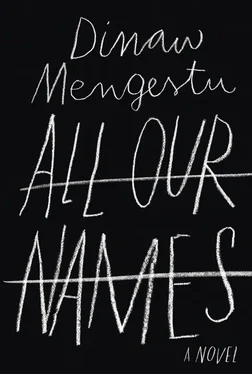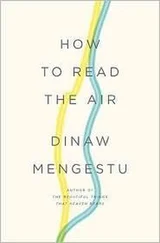“How would you feel about living on a farm?” I asked him.
“That depends. Are you there with me?”
“Maybe if you were good, I’d come visit you on the weekends.”
When it came to more domestic fantasies, however, we fell apart. The distance between what we had and what we wanted was too obvious if we dreamed close to home.
I remember taking him to the post office once so he could mail a letter to his mother. While we stood in line to buy stamps, I asked him what her name was. He looked up as if he no longer knew the answer to that question, or had lost the right to answer it.
“Her name doesn’t matter,” he said. “Everyone only calls her Imaye. It means ‘Mother.’ ”
When we reached the teller, Isaac handed me the envelope. He was shy speaking in front of strangers, so I was the one who asked how many stamps were needed to mail the letter. While we waited, I tried to pronounce her name the same way he had. I said out loud: “Im-e-ya… Im-a-yu.”
“Not even close,” he said.
He pronounced it once more so I could hear how far off I was, and finally, after failing two more times, I laughed and said, “Forget it. When we meet, I’ll just call her Mother.”
He became silent. What I had said bothered him. I didn’t know him well enough yet to understand why, but I felt the distance expanding between us. We paid for the stamps and left the post office, and it wasn’t until we were alone in the car that he told me what he was thinking.
“It doesn’t do us any good to talk about things that will never happen,” he said.
I promised myself I would never ask him about his family again, and by and large I stayed true to that. I thought as well, however, that if we couldn’t have a future, I could at least try to make the most of our present. We were running out of errands and chores to complete, and it was time, I told him, we moved on to something else.
“We’re going to have to find other things to do,” I said, “except go to the grocery store.”
“What would you like?”
I thought of all the possible options open to us. I thought of what normal couples did. They went to the movies, dinner. They invited friends over on the weekend. They had beach vacations. I knew we couldn’t get away with any of that, so I told Isaac, “I don’t know. But I’ll come up with something.”
I decided over breakfast with my mother that certain risks had to be taken if Isaac and I were going to have any sort of life together. I didn’t make this decision lightly. She asked me that morning, while setting the table, “Do you have a new friend, Helen?” She was dependent on gentle phrasing; that was the register we carried on all our conversations in: “Would you like to help me with the shopping this weekend, Helen? Do you think it’s time we changed the curtains in the living room, Helen?”
I always responded in kind.
“No one that I know of,” I said. “But I promise to keep looking.”
The last time she had asked that question was shortly after I began working with David. I spoke of him often around the house, and if there was anyone I spent the weekends and evenings with, it was him. She asked me repeatedly if David was a special friend — a hope abruptly relinquished once she met him. Telling her about Isaac wouldn’t have brought her any comfort.
David was the only one who had suspected, and even he was quietly alarmed by the suggestion.
When we were alone, in his office, he had said, “I hope you know what you’re doing with your Dickens.” It wasn’t a reproach; I had the feeling he found saying those words embarrassing. I nodded and tried to make it all seem lighthearted.
“Of course I know,” I said. “I’m a professional at this.”
We weren’t divided like the South and had nothing to do with any of the large cities in the North. We were exactly what geography had made us: middle of the road, never bitterly segregated, but with lines dividing black from white all over town, whether in neighborhoods, churches, schools, or parks. We lived semi-peacefully apart, like a married couple in separate wings of a large house. That was the image I had in mind during breakfast when I decided something different had to be done. Change! It seemed to be everywhere except Laurel.
I set my sights low. Incremental progress was my philosophy. We didn’t have to be heroes. There had been enough of those already, and in many ways, I reasoned, Isaac and I had already picked up the fight; we just hadn’t known that was what we were doing. I made a list of all the places we had gone to in the three months since we’d met: the grocery store, the mall, post office, bank, Goodwill. I thought of them while sitting at my desk and tried to remember if any obvious signs of affection had passed between us. I came up with a crude value system to measure each trip by.
1) Shopping for food: After sex and children, what could be more intimate in America than choosing what kind of meat to cook? The grocery store was the first place in our town that I knew for certain we had conquered. We went once, sometimes twice a week. We laughed in the aisles, took turns pushing the cart. I gave him cooking lessons at the meat counter. Those were all important victories.
2) The post office: I had to admit that had been a terrible loss, and because it was a government office I felt I had to weigh the defeat a bit more. One post-office defeat was the equivalent of two grocery-store victories. Mail was dangerous, personal letters especially. They pointed to great distances and old, mysterious lives I knew nothing about. There were tellers instead of clerks, forms that had to be filled. It would be difficult, if not impossible, to win in a place like that.
3) Anything else that was related to shopping: furniture, plates, cutlery — we had chosen all that together, right under the skeptical eye of the clerks. Had Isaac and I touched each other once, I would have said we dealt an important blow against segregation, but I had to be honest. I knew we had never touched except by accident, so I had to temper the victory with the knowledge that we could have done better.
What I needed next were new targets. The first one that came to mind was the most obvious, and I couldn’t believe I hadn’t thought of it before. A week after our defeat at the post office, I called Isaac from my office and said I wanted to take him out to lunch.
“To lunch?”
“Yes,” I said, “for lunch. I’m tired of eating at my desk alone.”
I chose the same diner my father had gone to every morning, and where as a child I had joined him on Saturday afternoons. It was the only place in Laurel that I associated exclusively with him. I had been going there for years, on my own and with friends and co-workers, but those other occasions were mere intrusions on the central event, a semi-regular father-daughter lunch that had lasted for two years and that had ended in one of those booths with my father promising to visit every week once he moved out. A month went by before I saw him again. I stopped worrying, and then, with more time, caring if he returned. Gradually, my memories of him were distilled into a single fluid image of a man confined to a booth, or counter, with thick sideburns and occasionally a soft mustache that moved when he spoke, which wasn’t often.
The diner was never officially segregated, but I couldn’t remember anyone who wasn’t white eating there, either. In this case it was etiquette, and not a sign, that served as the cover for our division. Before I left to pick up Isaac, I wrote down on a piece of paper in case I forgot it later: “We have every right to be here.”
We arrived shortly after noon, when I knew the restaurant would be crowded. Isaac said he could meet me there, but I insisted on picking him up so everyone could see us walk in together. The lunch counter was already full. Of the half-dozen men sitting there, I knew three by name and the others were familiar. Bill, whose chest and forearms were known throughout Laurel for the strong black hair that sprouted from them, was leaning over the counter smiling halfheartedly at everyone who came and left. My father used to tell me to be careful with my food when Bill stood over us. “He sheds,” he told me, “like a dog.”
Читать дальше












